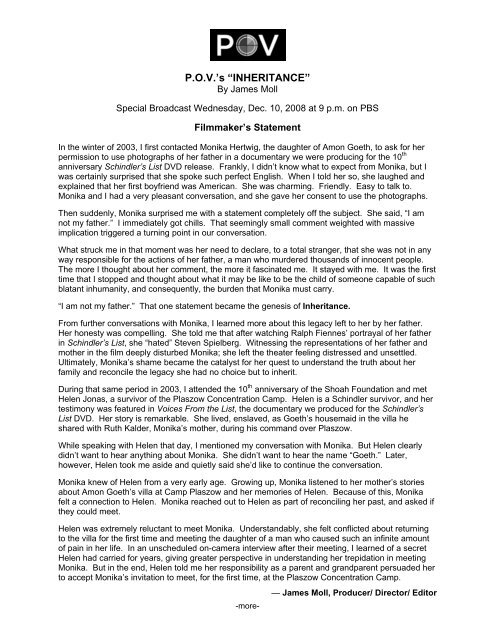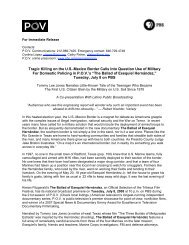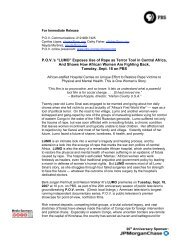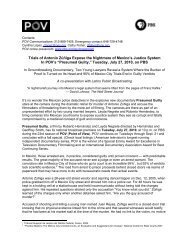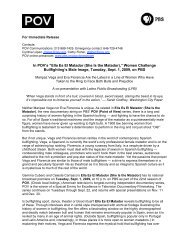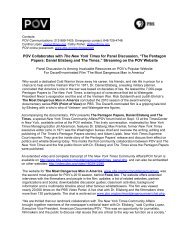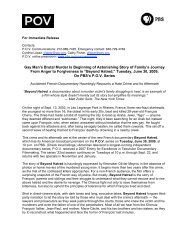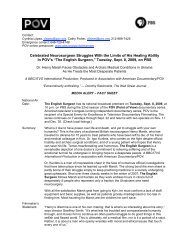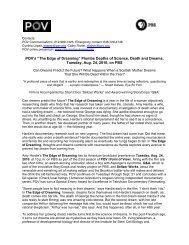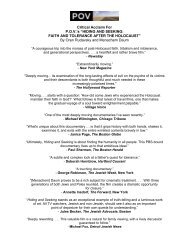P.O.V.'s “INHERITANCE” - American Documentary, Inc.
P.O.V.'s “INHERITANCE” - American Documentary, Inc.
P.O.V.'s “INHERITANCE” - American Documentary, Inc.
Create successful ePaper yourself
Turn your PDF publications into a flip-book with our unique Google optimized e-Paper software.
P.O.V.’s <strong>“INHERITANCE”</strong>By James MollSpecial Broadcast Wednesday, Dec. 10, 2008 at 9 p.m. on PBSFilmmaker’s StatementIn the winter of 2003, I first contacted Monika Hertwig, the daughter of Amon Goeth, to ask for herpermission to use photographs of her father in a documentary we were producing for the 10 thanniversary Schindler’s List DVD release. Frankly, I didn’t know what to expect from Monika, but Iwas certainly surprised that she spoke such perfect English. When I told her so, she laughed andexplained that her first boyfriend was <strong>American</strong>. She was charming. Friendly. Easy to talk to.Monika and I had a very pleasant conversation, and she gave her consent to use the photographs.Then suddenly, Monika surprised me with a statement completely off the subject. She said, “I amnot my father.” I immediately got chills. That seemingly small comment weighted with massiveimplication triggered a turning point in our conversation.What struck me in that moment was her need to declare, to a total stranger, that she was not in anyway responsible for the actions of her father, a man who murdered thousands of innocent people.The more I thought about her comment, the more it fascinated me. It stayed with me. It was the firsttime that I stopped and thought about what it may be like to be the child of someone capable of suchblatant inhumanity, and consequently, the burden that Monika must carry.“I am not my father.” That one statement became the genesis of Inheritance.From further conversations with Monika, I learned more about this legacy left to her by her father.Her honesty was compelling. She told me that after watching Ralph Fiennes’ portrayal of her fatherin Schindler’s List, she “hated” Steven Spielberg. Witnessing the representations of her father andmother in the film deeply disturbed Monika; she left the theater feeling distressed and unsettled.Ultimately, Monika’s shame became the catalyst for her quest to understand the truth about herfamily and reconcile the legacy she had no choice but to inherit.During that same period in 2003, I attended the 10 th anniversary of the Shoah Foundation and metHelen Jonas, a survivor of the Plaszow Concentration Camp. Helen is a Schindler survivor, and hertestimony was featured in Voices From the List, the documentary we produced for the Schindler’sList DVD. Her story is remarkable. She lived, enslaved, as Goeth’s housemaid in the villa heshared with Ruth Kalder, Monika’s mother, during his command over Plaszow.While speaking with Helen that day, I mentioned my conversation with Monika. But Helen clearlydidn’t want to hear anything about Monika. She didn’t want to hear the name “Goeth.” Later,however, Helen took me aside and quietly said she’d like to continue the conversation.Monika knew of Helen from a very early age. Growing up, Monika listened to her mother’s storiesabout Amon Goeth’s villa at Camp Plaszow and her memories of Helen. Because of this, Monikafelt a connection to Helen. Monika reached out to Helen as part of reconciling her past, and asked ifthey could meet.Helen was extremely reluctant to meet Monika. Understandably, she felt conflicted about returningto the villa for the first time and meeting the daughter of a man who caused such an infinite amountof pain in her life. In an unscheduled on-camera interview after their meeting, I learned of a secretHelen had carried for years, giving greater perspective in understanding her trepidation in meetingMonika. But in the end, Helen told me her responsibility as a parent and grandparent persuaded herto accept Monika’s invitation to meet, for the first time, at the Plaszow Concentration Camp.-more-— James Moll, Producer/ Director/ Editor
Producer’s StatementWhile working on Voices From the List, a documentary about Oskar Schindler, I stumbled acrossseveral uncredited photos of Nazi commander, Amon Goeth. I soon reached out to archivalsources, Jewish organizations, and Holocaust historians in the U.S., Europe and Israel in an attemptto find the copyright holder of the photos. After three months of tireless searching, I found anorganization that told me the photos belonged to a woman named Monika Hertwig. What they saidnext floored me. Monika Hertwig was the daughter of Amon Goeth.Because of how Schindler’s List shed a bright light on Monika’s father and his participation in theHolocaust, I assumed Monika wouldn’t allow us to use her photos in the documentary. I evenimagined her to have completely withdrawn from ever acknowledging this history. The decision tocall Monika came after a long conversation between James Moll, the director of Inheritance, andme. We concluded it was unfair to make assumptions about Monika and how she may react. In theend, that phone call began a dialogue between James and Monika, resulting in the making ofInheritance.Nine months later, our eight-member crew boarded a plane out of Los Angeles and begandocumenting the dual stories of Monika Hertwig and Helen Jonas, the woman Monika’s fatherenslaved during the Holocaust as a housemaid in his villa at the Plaszow Concentration Camp. Thebrief 13-day shoot took us to three different countries and ran on schedule despite the usualproduction mishaps, such as almost missing a flight due to heavy rains in New York, and the airlinesmisplacing our camera equipment while en route to Krakow.We met Helen first at her home in New Jersey. Even though documentary film crews ideallymaintain their objectivity and interact as little as possible with the subjects, Helen’s warmth, coupledwith her own personal history, made it virtually impossible for the crew not to be drawn to her. Dayslater, we traveled to meet Monika at her home, roughly 50 miles from Munich. Before we started,Monika had reservations about the interview. She was anxious and said she couldn’t stop thinkingabout the interview her mother did in the early 1980’s which was the catalyst for her mother’ssuicide. We empathized with Monika and an emotional bond towards her immediately developed.Our concern became evident, and Monika soon relaxed and eased into her interview.Soon after, we traveled with Monika to Krakow, Poland where we met with Helen and her daughter,Vivian, the following day. Having bonded with Helen and Monika, the entire crew discussed thegenuine affection we felt towards both women and how protective we felt of them. However, werealized the importance of the meeting between these women and how objectivity was critical indocumenting it. We collectively agreed that during our shoot in Krakow, distance andprofessionalism would be maintained. And it was.The meeting between Monika and Helen took place in one day. As the crew returned to our hotel towrap the shoot and prepare for the departure back to the US, Helen approached me in the lobby andasked if we would please do another follow-up interview with her. She told me there was somethingshe needed to share that she had never spoken about outside of her immediate family. Helen said ithad always been too painful for her to discuss, but now having met Monika, she was ready to talkabout it with us. Helen’s revelation during the interview is extremely personal and helps usunderstand how the events of the Holocaust still affect her life.Monika and Helen are both truly remarkable people, and their individual and collective stories havetaught me a great deal about how I choose to look at my own life. I consider myself very fortunatefor having spent time with each of them, and am humbled by the experience I had in documentingtheir stories.— Christopher Pavlick, Producer


